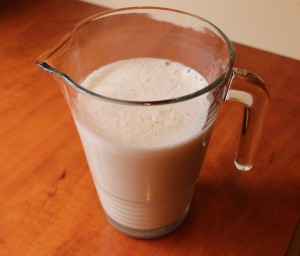Tag Archives: almond milk
Almond Milk vs. Rice & Soy Milk
Almond milk is one of the most nutritious milk substitutes available!
 If you have a blender at home, I recommend you start making your own almond milk, it only takes 15 minutes, and it is SO MUCH better than drinking processed milk! You only need two ingredients, Organic Almonds and Water! It is also low in calories and fat!
If you have a blender at home, I recommend you start making your own almond milk, it only takes 15 minutes, and it is SO MUCH better than drinking processed milk! You only need two ingredients, Organic Almonds and Water! It is also low in calories and fat!
Almond milk is great for people who are allergic to Soy because it contains no soy, also for those who are lactose intolerant because it contains no lactose.
Almond milk doesn’t contain casein, a milk protein that’s chemically similar to gluten, almond milk is appropriate for those who suffer from gluten allergies. Isn’t that great!
However, both rice and soy milk are good milk alternatives for those who have milk allergies or are lactose intolerant, but you should buy manufactured rice and soy milk to insure that they’re properly fortified with the vitamins and minerals you need. Because almonds are naturally very nutritious, almond milk doesn’t need to be fortified.
Almond milk is richer in vitamins and minerals than soy or rice milk and it’s also a healthier choice than cow’s milk.
Almonds are rich in nutrients including fiber, vitamin E, magnesium, selenium, manganese, zinc, potassium, iron, phosphorus, tryptophan, copper and calcium. Almond milk does not have as much protein and calcium as cow’s milk and other animal milk substance
Nutritional Values in 1 Cup of Raw Unsweetened Almond Milk
| Calories | 40 | Sodium | 180 mg |
| Total Fat | 4 g | Potassium | 180 mg |
| Saturated | 0 g | Total Carbs | 1 g |
| Polyunsaturated | 0 g | Dietary Fiber | 0 g |
| Monounsaturated | 0 g | Sugars | 0 g |
| Trans | 0 g | Protein | 1 g |
| Cholesterol | 0 mg | ||
| Vitamin A | 10% | Calcium | 45% |
| Vitamin C | 0% | Iron | 4% |
*Percent Daily Values are based on a 2000 calorie diet. Your daily values may be higher or lower depending on your calorie needs.
